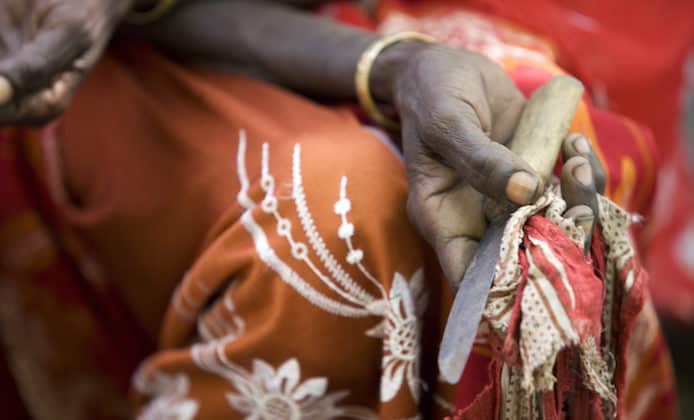Following yet another tragic death in Sierra Leone as a result of Female Genital Mutilation (FGM), 130 women’s rights organisations from across the country and around the world have signed an open letter urging the government to criminalize FGM and protect women and girls from this harmful practice.
Maseray Sei, 21, died on December 20, 2021, a day after being subjected to FGM, from severe haemorrhage and shock, as verified by a post-mortem on January 14, 2022. A 15-year-old girl was rushed to hospital for urgent care after experiencing major problems as a result of FGM a few days after Maseray’s death in a separate district.
These are unfortunately not isolated events in Sierra Leone. In recent years, many women and girls have died or experienced devastating harm as a result of FGM, and during the latest holiday period, there were widespread reports of hundreds of young women and girls being cut.
According to the 2019 report, Sierra Leone has one of the highest FGM prevalence rates in Africa, with 83 percent of women and girls aged 15 to 49 years having had the surgery.
FGM is the partial or entire removal of the external female genitalia or other harm to the female genital organs for non-medical reasons, which is internationally recognised as a severe human rights violation. It is a kind of violence against women and girls that is a symptom of gender inequality and discrimination, as well as a form of torture recognised by the United Nations. Hemorrhaging, infections, extreme pain, urine retention and other urinary system disorders, and psychological trauma are all short-term effects of FGM. FGM, like Maseray Sei and other victims, can lead to death.
Chronic infections, cysts, and ulcers; painful scar tissue; bladder, uterus, and kidney problems; sexual health issues; mental health issues; infertility; menstrual complications; difficulties during childbirth; and an increased risk of infant and maternal mortality are some of the long-term effects.
Awoko reports that Despite the harm caused by FGM, Sierra Leone’s government has failed to make the practice illegal.
Sierra Leone laws does not expressly ban FGM, and no FGM-related charges have been reported. Furthermore, gender inequality in Sierra Leone means that current laws intended to prevent and punish offenders of female genital mutilation are not being adequately executed.
Following the deaths from FGM of 19-year-old Fatmata Turay in 2016, 10-year-old Marie Kamara, and now Maseray’s death, organizations in Sierra Leone campaigning against FGM wrote each time to the President and Attorney General in office but never received a reply.
The signatories of this open letter call on the Government of Sierra Leone, President Julius Maada Bio, and Attorney General Mohamed Lamin Tarawalley Esq. to urgently enact a law that explicitly bans FGM for all ages, put in place adequate measures to protect against and eliminate FGM and give survivors and the families of victims a means to access justice.
The signatories strongly condemn the actions of politicians who are supporting FGM, and call on the State to prosecute all offenders putting the lives of women and girls at risk. This includes a comprehensive and swift police investigation and prosecution of all those responsible for the death of Maseray Sei. The signatories argued that a law explicitly banning FGM in Sierra Leone would make it clear to its citizens that FGM is a human rights violation and a form of gender-based violence. It would define the government’s obligations in providing protection to women and girls, demonstrate political will and intent, and communicate that the State is ready to take action.
A law against FGM would empower women and girls to recognize and assert their human rights and to seek and receive protection when vulnerable. For those whose rights have been violated, a law would provide legal recourse within the criminal justice system, and create tools to hold perpetrators to account. It would also act as an important deterrent to would-be offenders.
Having a legal framework which states FGM is unacceptable and unlawful is a vital component of promoting the social and behavioral change needed to encourage people at the community level to abandon the practice.
To ensure the full implementation of the law, a Multi-Sectoral Approach (MSA) should be applied which brings together state and non-state actors working in collaboration. Authorities need to deliver adequate funding to grassroots organizations and other stakeholders, and legislation should be accompanied by community engagement, awareness raising about the dangers of FGM, and empowerment of women and girls.
As part of achieving the Sustainable Development Goals, all countries – including Sierra Leone – are duty-bound to measure the extent to which FGM occurs amongst their population. It is vital that information is gathered and made publicly available. Such data is invaluable in efforts to end FGM because it makes clear the need for action, and provides a baseline from which the scale up and effectiveness of interventions to end it can be measured.
Importantly, by criminalizing FGM, Sierra Leone’s government would be meeting their commitments to the African Union’s Protocol on the Rights of Women in Africa (the Maputo Protocol) and to the UN Convention on the Elimination Discrimination against Women (CEDAW).


 Post a comment
Post a comment










Comment(s)
Disclaimer: Comments expressed here do not reflect the opinions of Sierraloaded or any employee thereof.
Be the first to comment